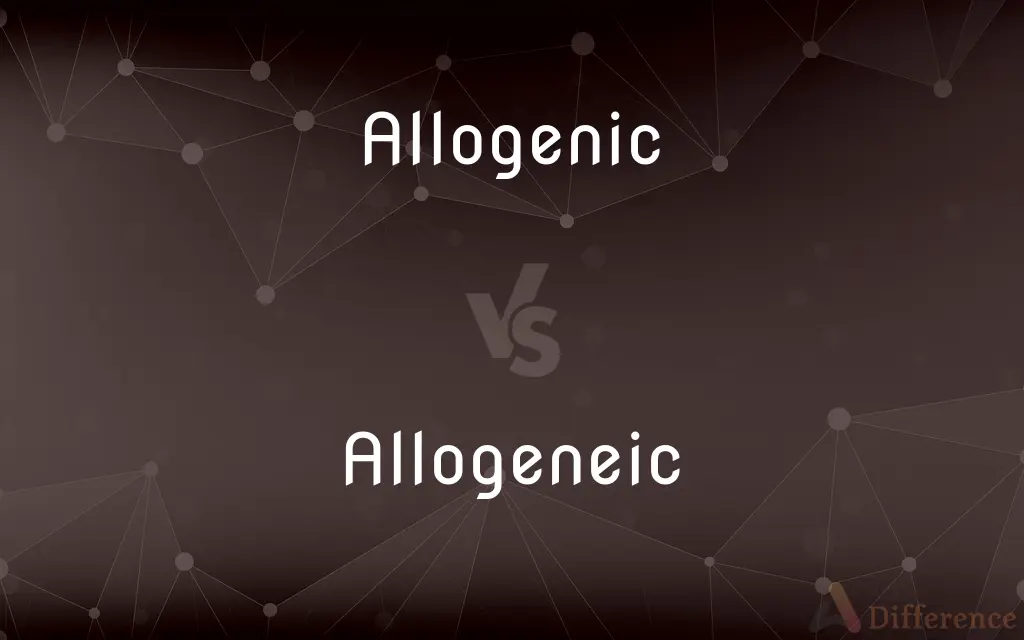Allogenic vs. Allogeneic — What's the Difference?
By Urooj Arif & Fiza Rafique — Updated on April 6, 2024
Allogenic refers to geological processes or materials formed by external factors, while allogeneic pertains to biological tissues or cells from a genetically different individual of the same species.

Difference Between Allogenic and Allogeneic
Table of Contents
ADVERTISEMENT
Key Differences
Allogenic processes or materials in geology are influenced by external forces or environments, such as sediment transport and deposition by water, wind, or ice. These processes are external to the site of deposition and often involve the movement of materials from one location to another, impacting the earth's surface and subsurface formations. On the other hand, allogeneic in a biological context refers to cells, tissues, or organs transplanted from a donor to a genetically non-identical recipient within the same species, highlighting genetic difference but species similarity.
In the realm of geology, allogenic forces play a pivotal role in shaping landscapes and forming geological features. They contrast with autogenic processes, which originate within the system, such as sediment compaction and lithification. Whereas, in medicine and biology, allogeneic transplants are crucial for treatments requiring tissue replacement, such as bone marrow transplants, emphasizing the importance of genetic diversity within the same species for compatibility and immune response.
The concept of allogenicity in geology underscores the importance of external environmental influences on geological formations, demonstrating how landscapes and geological features can be shaped by the movement and deposition of materials over time. In contrast, the use of allogeneic tissues or cells in medicine underlines the advancements in medical treatments, the complexities of immune system interactions, and the significance of genetic matching for transplant success.
Understanding the distinction between allogenic and allogeneic is crucial for professionals and researchers within their respective fields. In geology, recognizing allogenic processes helps in interpreting earth's history and predicting future changes. Meanwhile, in biology and medicine, distinguishing between allogeneic and autologous (coming from the same individual) transplants is essential for understanding transplant dynamics, immunology, and patient care strategies.
While both terms share a prefix that suggests "other" or "different," their usage in distinct scientific contexts—geology for allogenic and biology/medicine for allogeneic—highlights the interdisciplinary nature of scientific terminology. The concepts of external influence in geology and genetic difference in biology, though vastly different in application, both emphasize the impact of external factors on natural systems, whether it be the physical environment or biological compatibility.
ADVERTISEMENT
Comparison Chart
Definition
Refers to processes or materials influenced by external environments
Pertains to cells or tissues from a genetically different individual
Context
Geological formations and features
Transplants and immunology
Key Importance
Shaping landscapes, sediment transport
Tissue compatibility, immune response
Contrasts with
Autogenic processes (originating internally)
Autologous transplants (from the same individual)
Example
River sediment deposition by water flow
Bone marrow transplant from a donor to a recipient
Compare with Definitions
Allogenic
External to the system or environment.
Allogenic contributions to soil composition include wind-blown dust.
Allogeneic
Involving an immune response to non-self tissues.
Allogeneic transplant rejection is a risk if the donor and recipient are not closely matched.
Allogenic
Influenced by external factors, especially in geological formations.
Allogenic sediment deposition plays a crucial role in delta formation.
Allogeneic
Pertaining to the genetic difference within the same species.
Research in allogeneic therapies focuses on minimizing immune rejection.
Allogenic
Not originating from the local site or system.
Allogenic minerals in the rock strata indicate transport from distant sources.
Allogeneic
In the context of biology and medicine, referring to external genetic sources.
Allogeneic stem cell therapies offer hope for regenerative medicine.
Allogenic
Referring to geological changes caused by external factors.
The valley's allogenic features were sculpted by glacial movements.
Allogeneic
Relating to cells or tissues from a genetically different individual of the same species.
Allogeneic bone marrow transplants are used to treat certain types of leukemia.
Allogenic
Pertaining to materials or processes originating outside the local area.
The canyon's landscape was shaped by allogenic forces like river erosion.
Allogeneic
Used in medical treatments requiring genetic diversity.
Allogeneic skin grafts are crucial for treating severe burns.
Allogenic
Being genetically different although belonging to or obtained from the same species
Allogeneic tissue grafts.
Allogeneic
Being genetically different although belonging to or obtained from the same species
Allogeneic tissue grafts.
Allogenic
Having an external cause, or source; exogenous.
Allogeneic
(genetics) Genetically different because of being derived from separate individuals of the same species.
Allogenic
(geology) Formed in another location and transported.
Allogeneic
(immunology) Of a reaction that occurs when cells are transplanted into a genetically different recipient.
Allogenic
Alternative form of allogeneic: genetically distinct, but of the same species; nonself but intraspecies.
Common Curiosities
How do allogeneic transplants work?
They involve transferring cells, tissues, or organs from a genetically different donor to a recipient within the same species, relying on immune system compatibility.
Are all geological formations influenced by allogenic processes?
While many are, some formations result from autogenic processes, which originate within the local system without external influence.
Why is genetic diversity important in allogeneic transplants?
Genetic diversity is crucial for reducing the risk of immune rejection and ensuring the transplant's success.
What advancements have been made in allogeneic transplant techniques?
Advances include better genetic matching, improved immunosuppressive therapies, and techniques to minimize rejection and complications.
What makes a process or material allogenic in geology?
It's influenced by external factors, such as environmental conditions outside the local system.
Can allogenic processes occur in any geological setting?
Yes, allogenic processes can influence a wide range of settings, from river deltas to mountain formations, anywhere external factors play a role.
What are the risks associated with allogeneic transplants?
The main risks include immune rejection, where the recipient's body attacks the transplant, and graft-versus-host disease in certain transplants like bone marrow.
Can allogeneic cells be used in regenerative medicine?
Yes, allogeneic cells are increasingly used in regenerative therapies for their potential to repair or replace damaged tissues and organs.
How do scientists differentiate between allogenic and autogenic influences in geology?
By analyzing the origin of materials and processes, determining whether they come from external forces or internal system dynamics.
How is compatibility determined for an allogeneic transplant?
Through genetic testing, including HLA typing, to ensure the donor and recipient's immune systems are as compatible as possible.
Share Your Discovery

Previous Comparison
Advertisement vs. Propaganda
Next Comparison
Dielectric vs. CapacitorAuthor Spotlight
Written by
Urooj ArifUrooj is a skilled content writer at Ask Difference, known for her exceptional ability to simplify complex topics into engaging and informative content. With a passion for research and a flair for clear, concise writing, she consistently delivers articles that resonate with our diverse audience.
Co-written by
Fiza RafiqueFiza Rafique is a skilled content writer at AskDifference.com, where she meticulously refines and enhances written pieces. Drawing from her vast editorial expertise, Fiza ensures clarity, accuracy, and precision in every article. Passionate about language, she continually seeks to elevate the quality of content for readers worldwide.















































